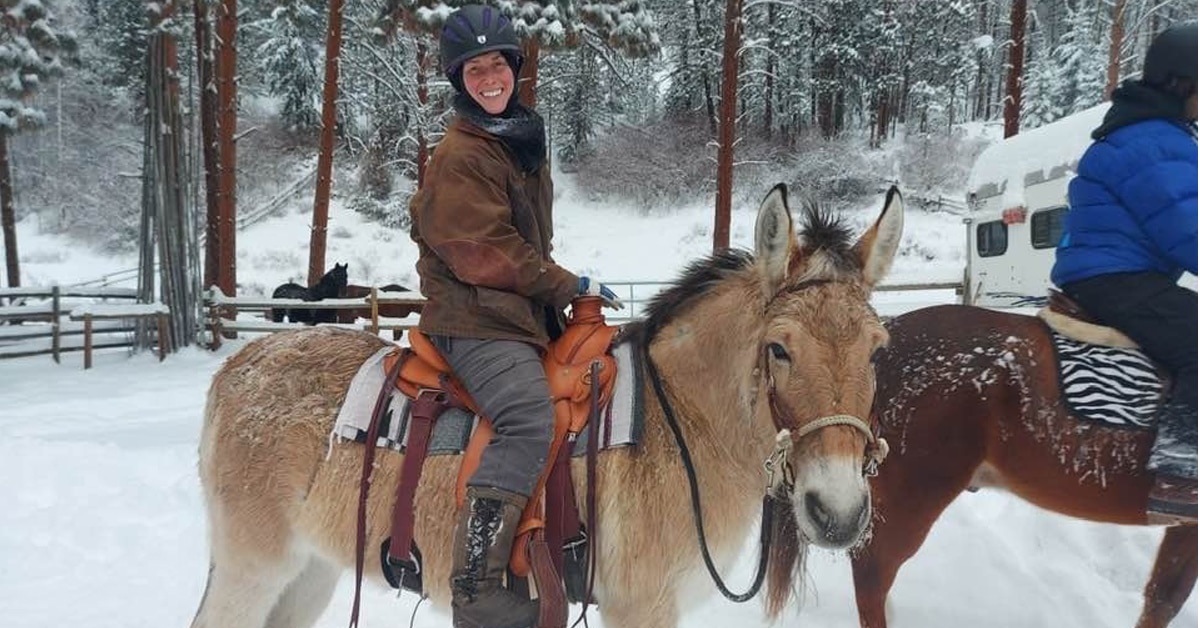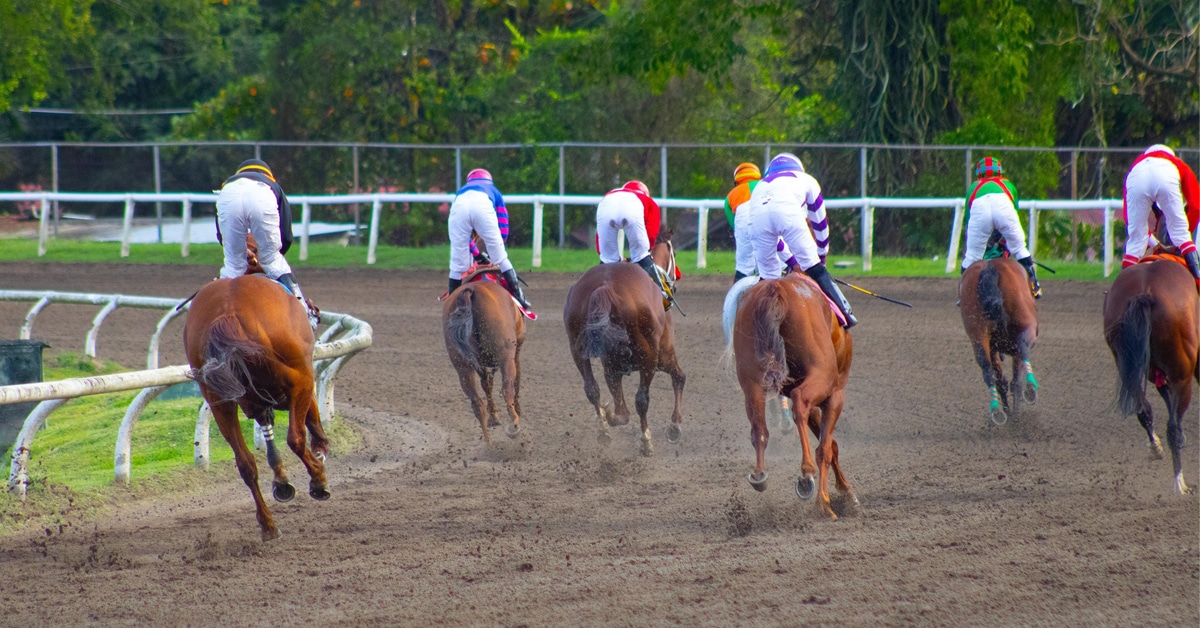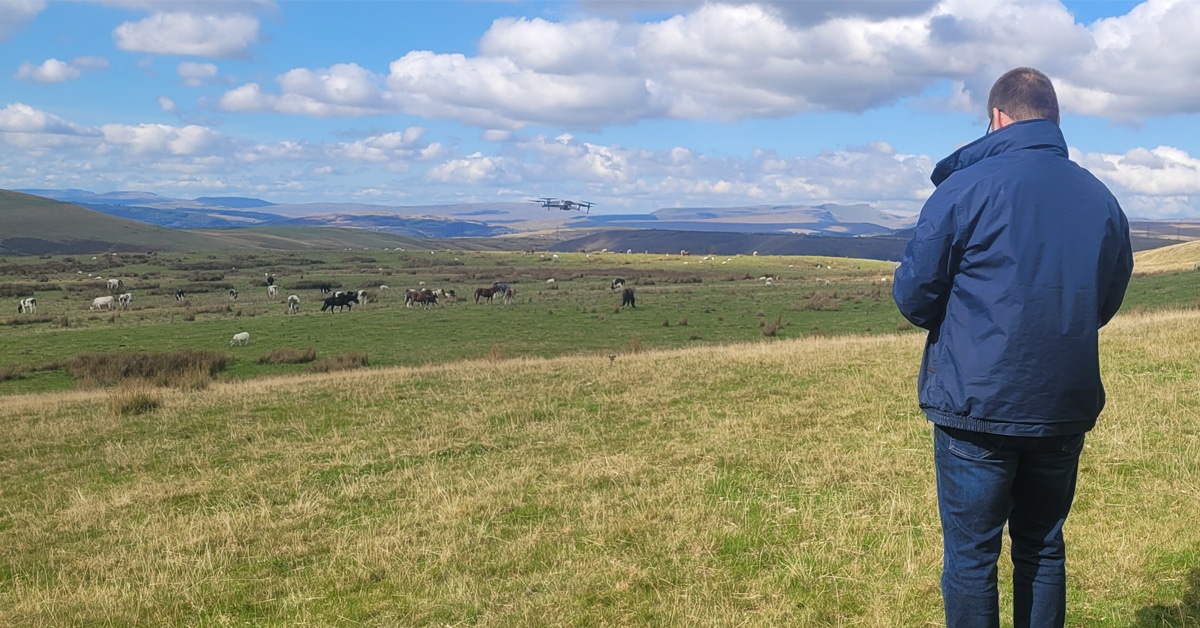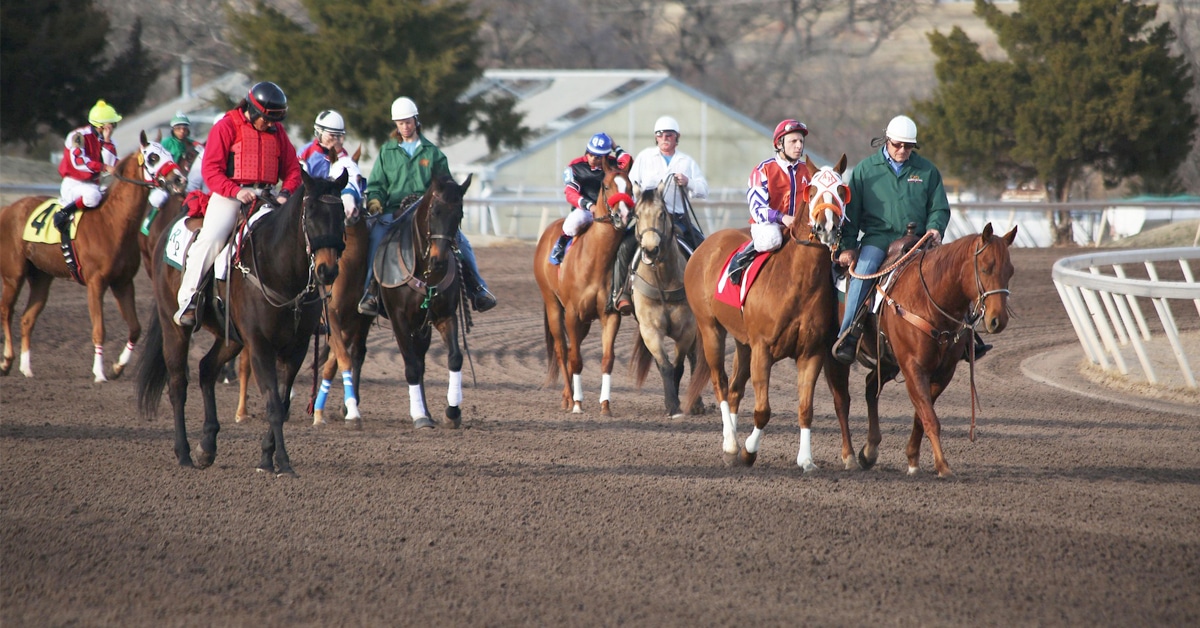While alternative or complementary therapies may not be as controversial as they once were, those who use them on their horses are urged to do so with common sense. Here, we look at various options for horse owners who find the holistic approach to horse health appealing, as well as cautions from conventional veterinarians.
Alternative Therapies
Dr. Alison Seely was a veterinarian before she married into a family of five chiropractors. “I witnessed first-hand many successful stories in my husband’s office and felt there was a need to offer this therapy for animals,” she said. Seely became one of the first students to study at the American Veterinary Chiropractic program offered in Moline, Illinois in 1995, and has been practicing chiropractic on animals, including horses, from her clinic in the Ottawa Valley ever since.
As alternative medical treatments have become popular for people, it’s not surprising that many also seek them out for their animals. Some of these treatments may be provided by veterinarians while others are provided by practitioners, either certified through a school or training program, or self-taught.
What makes a treatment “alternative?” Any treatments not included in the evidence-based boundaries of conventional medicine can fit that category. While many people use the terms alternative medicine and complementary medicine interchangeably, in fact, they most accurately refer to how the treatment is used. If, for example, conventional medicine recommended a painkiller for a horse with back soreness, but the owner chose to use chiropractic treatments instead, that would be choosing an alternative. If, on the other hand, the owner opted to use the painkiller recommended by the vet, but also gave the horse homeopathic remedies to help him heal, that would be providing a complementary treatment.
The reasons horse owners choose alternative therapies vary greatly from one owner to the next. Arie Brentnall Compton of Edmonton, Alberta, said, “My experience is that most equine health problems can be managed, treated and prevented with alternatives to conventional veterinary care. I have a rehabilitated off-the-track Thoroughbred, who has really benefited from massage therapy; my therapist also uses myofascial release and energy balancing.” Brentnall-Compton also uses aromatherapy and herbal preparations to treat her horses. “Alternative medicine sees health in another way, as something that can be created through preventative care, nutrition and looking at the well-being of the entire horse.”
Seely said that veterinarians often refer clients to her because, “they recognize that the horse is suffering from a musculoskeletal condition which would benefit from chiropractic care.” In other cases, the owner contacts her directly. Sometimes, this is because the person has been given a bleak prognosis by the vet practicing conventional medicine and the owner comes to Seely for a second opinion. Another common situation is that the owner is using chiropractic care for himself or herself, and believes chiropractic will help the horse.
Julie Anne Lee, DCH, ResHom, who provides homeopathic treatments for horses and companion animals from the Healing Place Veterinary Clinic in North Vancouver, BC, said she finds people often turn to homeopathy for their horses because “in some ways, horses are like part of the family, and people want the same treatments they use to be used on their animals. They wouldn’t want to be on antibiotics or steroids themselves, and they don’t want that for their horses.” Another common reason for choosing homeopathy, she added, is that the horse is being shown or raced, and the owners are looking for a treatment option that won’t show up in drug tests.
Sharon Quarrington, of Campbellville, Ontario, started using alternative methods about 15 years ago, after taking a training program with Linda Tellington-Jones. “Many of the participants in the program were from Europe, where homeopathics and herbs were a common practice, so I learned from them and then started trying them myself. I continued using them because I could see they had a positive impact on my horse.” Today, many alternative therapies such as homeopathy and flower essences are just part of her everyday routine in caring for the horses on her farm. “They help me deal with minor injuries, keep my horses in the best shape possible, and help them recover after something has gone wrong.”
Some horse owners opt to combine alternative treatments with conventional medical care, and most alternative practitioners support that approach. Seely, in fact, feels her background as a veterinarian helps her provide better chiropractic care to the horses she sees. “If the condition is medical, I will consult or refer to the traditional veterinarian. If concurrent medical care is not being sought because the owner would rather just opt for alternative care, there is a risk of a pathological condition remaining untreated.”
Andrea Scott is a Certified Equine Rehabilitation Therapist, who has practiced in the area of human sports medicine and orthopaedics for more than 20 years. “When I started riding, I noticed that horses, as athletes, injure themselves in much the same way humans do,” she said. “I saw no reason why horses could not benefit from the same services that are provided to human clients.”
Scott practices a variety of alternative therapies including the use of ultrasound waves and manual or manipulative therapy as well as acupuncture. Before she selects a modality and begins treat, however, she always begins with a functional assessment to evaluate the horse’s movement, spinal and peripheral joint function, strength, endurance and other physical abilities of both horse and rider. “The horse and rider are considered a functional unit,” she explained.
Scott decided to further her education at the Animal Rehabilitation Institute in Florida. She emphasizes that both the College of Veterinarians of Ontario and the College of Physiotherapists of Ontario require that physiotherapists work under direct referral from a veterinarian, ensuring coordinated care and collaborative work by the entire treatment team.
Lee is also required, by BC laws, to work with a veterinarian at her clinic, but the level of involvement depends on the client. “I find our clients are very diverse. Some say no surgery, no antibiotics, only homeopathy and holistic treatments. They have amazing successes. Others want a combination, so they may give the horse antibiotics and also provide support through homeopathy,” she said. The clinic is a primary homeopathic clinic, so homeopathy is the first mode of treatment to be offered. Standard testing techniques are used to diagnose illnesses and injuries.“Of course,” Lee added, “if the horse had a cut, we would stitch up the cut. But we’d also use homeopathy to speed up the healing. With our treatments, the healing time is incredibly short.”
But Lee said treating a horse who is also getting medication can be tricky. “Sometimes what we see is that a horse is sick, he’s given medications, then he gets more problems that are side effects of the drugs,” she said. “There can be many layers, so you have to be super clear about what is causing what.”
Lee said there are no contraindications for homeopathy. “I’ve worked with people whose animals were getting chemotherapy, and you can still use homeopathy. It’s pretty amazing how safe it is with everything.” Other alternative approaches may be less compatible with conventional medical care. “Even treatments like massage can have deleterious effects when applied at the wrong time to the wrong injury. That’s why it’s so imperative that any alternative treatments be coordinated with other members of the health care team,” said Seely.
Researching your options is also essential. “Our animals can’t talk,” said Lee, “so it is up to us to take a lot more responsibility for researching and looking at all the choices. It’s up to us to figure out what is the best solution for our horse. As the owner, you know your horse better than anyone, so you know when your horse is not well.”
Lee finds that vets often rely only on test results and not on “what you are feeling energetically from the horse. The tests may say the infection is gone, but the horse is still feeling crappy. In holistic medicine, you have to participate in the horse’s health and be aware of the changes.”
For horse owners wanting to know more about alternative treatments, Lee cautioned, “We don’t have the research like conventional medicine – but we can’t, because holistic medicine doesn’t work the same way. You can’t study it the same way. We are compiling records of all our cases, though, so we can show how just with homeopathy the diseases are cured.”
She does suggest that horse owners ask their practitioners about their education and training. “I am not a vet, but I did four years of school to learn human homeopathy, and then three more years in England to learn veterinary homeopathy.” Many courses in alternative therapies, she pointed out, are much shorter and may not give the practitioner the knowledge and confidence needed to provide appropriate treatments.
Traditional Medical Treatments
Ask Dr. Brad Hanna, who teaches at the Ontario Veterinary College, about alternative treatments for horses, and he’ll give you a little history lesson. “All medicine used to be driven by anecdote – ‘I did this, and the patient got better, so it must work’ – and philosophical theories. In Europe and North America, we used to rely heavily on bloodletting and blistering. Bloodletting was used for thousands of years by countless physicians, and it was based on the theory that there were four ‘humours’ in the body, and that illness was caused by an imbalance of these humours.” Veterinarians also practiced bloodletting when it was popular in human medicine.
Not anymore. Hanna explained that once scientific studies were begun, these treatments were shown to be harmful rather than helpful. The first doctor to record statistics kept track of the outcomes for patients with pneumonia that he’d treated with bloodletting, and also tracked those patients he wasn’t able to treat until they were past the acute stage. He intended to use this data to show how effective his treatments were, but instead found that while 55 per cent of the patients he treated survived, about 75 per cent of the patients who did not have the bloodletting treatment while they were sick survived. His treatment was actually worse than doing nothing. “He was killing 20 per cent of his patients,” said Hanna.
The reaction from other practitioners to this information was very negative. As Hanna explained, “They knew bloodletting worked because they’d seen their patients recover.” But another doctor, while highly sceptical about the results, decided to conduct a 10-year study. He got similar results. That was the beginning of the end for bloodletting, but it took many years before the practice entirely disappeared. “Doctors said, ‘My daily use of this therapy, and seeing the results, is all the evidence I need,’” said Hanna.
The scientific approach to medicine, Hanna said, is based on careful observation of nature, and on studies designed to remove human bias from the equation. “We can’t just simply decide not to be biased, so the studies have to be designed to eliminate that,” he said. “Scientists don’t take all the steps to create reliable trials just for fun, it’s because if we don’t do them we can come to the wrong conclusions.”
Hanna began investigating alternative treatments for horses because his veterinary students were asking questions about them. “I was curious,” he said. “I didn’t know much about them. It seemed to me that there could well be beneficial approaches from other cultures that had been ignored or swept aside during the movement towards scientific medicine. So, I started to look at what research was out there. What surprised me, and what continues to surprise me, is how easy it is to see the problems in the research studies that have been done. Some of the arguments made by the practitioners are simply not rational.”
Dianne Massacar of Havelock, Ontario, who owns two geldings, Bailey and Victory, disagrees with some of the comments she’s heard that vets don’t see the whole picture or are not collaborative. Bailey has had a problem with founder, and Massacar’s vet has helped her with pain medications and planning ways to reduce his grazing. “Now the vet is working with my farrier to design some special shoes to help him be more comfortable,” she said. She’s had other people suggest chiropractic treatments for Victory when he showed some stiffness in his movement, but Massacar said, “I shy away from things like that. My horses do live quite naturally – they are outdoors most of the time, with access to shelter. But I know I can rely on my vet to make the best recommendations when they are sick or injured.”
Most vets don’t recommend alternative treatments, and that’s because, as Dr. Scott Weese, another OVC professor, and contributor to www.wormsandgermsblog.com, said, “Alternative treatments have little evidence of effectiveness. That may not be a problem if conventional treatments are also being used, as long as there are no adverse effects, and probably the main downside of most unproven therapies is wasting time and money. However, we also have little information about safety, and some alternative therapies do have the potential for significant adverse effects. The more different things used, be they conventional or alternative, the more we have to be wary of interactions.”
Weese gave an example on his blog: Tea tree oil has been recommended as a natural way to treat infections in dog’s ears. He reported, however, that tea tree oil can be toxic to dogs, and a 2011 study by Dr. Becky Valentine found that it was quite toxic to canine skin cells. “Essential oils, herbs and other alternative treatments need to be studied, just like any other treatment. Natural products can be quite powerful and potentially useful, but they need proper testing,” said Weese.
Without those studies being done by the manufacturers, horse owners can’t count on safety or effectiveness. “The trouble with alternative medicine is that practitioners point to the people who recover – ‘Look at all my happy clients,’” said Hanna. “This gives no credit to the body’s ability to heal itself. It’s actually depressing to hear this comment, because we know better now. They are using the same arguments the bloodletting practitioners used – they also saw many patients recover. It is a serious error to think that daily experience with patients can teach what works and what doesn’t. It can’t.”
While some veterinarians are using alternative treatments, Hanna sees this as “a catastrophe for veterinary medicine. The veterinarian’s oath says vets should use scientific knowledge, and yet we have vets who fail to see the problem when a growing body of evidence shows that certain therapies don’t work.” Hanna said, for example, that it is clear from the best-quality evidence that homeopathy is ineffective. There have been numerous studies, conducted at research centres around the world, aimed to determine the efficacy of homeopathy. Through clinical trials, results have indicated that homeopathic medicines have no effects beyond placebo when treating minor ailments such as allergies, to serious diseases like cancer. Hanna also pointed out that research has shown that while people seem to feel better after acupuncture, it makes no difference where the needles are placed. In this study, some participants received actual acupuncture treatments, with the needles placed correctly, while others received a sham treatment, with needles placed away from the prescribed acupuncture points. Biochemical data (i.e. blood analysis) showed no differences between the two groups of participants.
“In science, we don’t develop philosophies and look for treatments to fit, we look at the evidence,” he added. Not that science is perfect – something Hanna readily admits. “But science starts with the perspective that there will be errors, and we try to design studies to minimize them,” he said. “In the medical community, people keep re-doing the studies, double-checking and re-checking. It’s because of that work that in a relatively short period of time we have gone from relying on bloodletting to having a large number of treatments that have been clearly demonstrated to save lives and heal animals.”
But how can horse owners learn about the treatments they are considering? “Looking to reputable scientific sources is the key,” said Weese. “Product brochures, testimonials and websites are not evidence. To know if something is safe and/or effective, you need proper published scientific data, and those are published in peer-reviewed scientific journals.”
If you are using an alternative treatment, Weese said it is absolutely critical to share this with your vet. “Adding on a treatment without the vet knowing is a recipe for disaster.”
Hanna is especially bothered by the suggestion he hears from some practitioners that scientific testing is not appropriate for alternative therapies. “If you really want to know if alternative therapies are effective, that requires critical investigation,” he said. “It is not difficult to design studies that take into account the individual approaches in homeopathic medicine, for example. But personal experiences can never tell us if something is effective or not. That’s how the bloodletters were fooled for so long.”
Hanna does feel that some herbal treatments may be effective – many modern drugs were originally developed from plants, he pointed out – but he needs to see solid evidence before backing any alternative therapies. “Much as I’d love to find a treatment that is effective and free of side effects, I’m not willing to delude myself,” said Hanna.
The Latest









